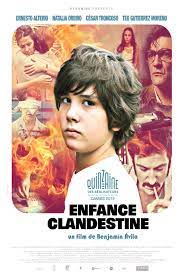
CLANDESTINE CHILDHOOD/ INFANCIA CLANDESTINA
Argentina, 2011, 111 minutes, Colour.
Ernesto Alterio, Natalia Oreiro, Cesar Troncoso, Teo Gutierrez Moreno, Cristina Banegas, Violeta Palukas.
Directed by Benjamin Avila.
An interesting retrospect from 2011 on the years of the rule of the generals in Argentina. There have been many films on these years, on the oppression, on the victims, cruel torture, of the assemblies of the mothers, on resistance.
The story focuses on a strong couple of resistors, extremely staunch, taking refuge at times in Cuba, concerned about their children, especially about the young boy. Eventually, they are able to return to Argentina in the mid-1970s, taking on a new identity, finding a new place, settling themselves in, the boy at school, and the care of a fellow patriot who acts as a kind father figure.
So, the film focuses very much on the boy and his clandestinely childhood, a new name, the relationship with his parents, with the father figure, coping at school, concealing the truth. And there is a visit from his grandmother – and a danger that she will expose the truth.
There are attacks from the authorities, the death of his father figure, the opposition of his parents – and some dire results.
So, the man looks back on his childhood, the political and social situations of his country, his strange childhood and upbringing, his relationship with his family, something that so many Argentinian families had to deal with.
- Based on a true story? Argentina? The post-Peron era, the generals, the oppression, the resistance and revolution? The 1970s, 1975-1979?
- The film as a tribute to those who suffered in this time, revolution, those killed, the harsh administrations, torture? The memories of the writer-director and the final acknowledgements?
- The explanation of the situation, government in Argentina, the military takeover, the oppression, rebels, going into action, refuge in Cuba, the return, living clandestinely, the effect on families, different names, different identities, the gathering of allies, the meetings, the plans, action, and deaths?
- The portrait of the family, the mother and father and their commitment, in Argentina, in Cuba, finding ways of returning to Argentina, separately, mother and baby, father and son? The reliance on Beto? His covering for them? Documentation, setting them up, allegedly from Cordoba?
- The life of the parents, the intensity of the father, absolutely committed, no leeway, humourless? Righteous in his cause? The passion of the mother, story of meeting her husband, their love, commitment? The visit of her mother, the secrecy, the emotion of her mother, wanting them to leave? The dangers? The gathering of the supporters, blindfold, the meetings, decisions? The later action, Beto and his being taken, the grenade, his death? The final action, and the news of the death of the father?
- The focus on the childhood, Juan, his being known as Ernesto, his age, comprehension, his experiences, within the family, with each parent, caring for his sister, the dangers, the hideaway behind the cartons? Going to school, the introduction, the anthem, the issue of the flag, the Beltrano flag, his not wanting to raise the national flag? Settling into the school, with the other children, their acceptance of him, the birthday party, discovering the false birth date on the passport? The parents, the reaction? Beto, his organising everything, his grandmother coming, happiness?
- The boys at the school, their talk, together, eyeing the girls? The gymnastics? Juan and his noticing Maria, her gymnastics, talking with her, the gradual bonding, her comments about her brother?
- Beto, his encouragement, a father figure for Juan? His death, Juan and his memories of his uncle’s encouragement?
- The dangers, finding the money, deciding to run away to Brazil with Maria, meeting with her, her not wanting to leave? His return?
- The final dangers, hiding, the authorities, the interrogation, his declaring his name as Ernesto, concerned about his sister, the bullying of the military, delivering him to his grandmother?
- At his grandmother’s door, his finally saying his own name?